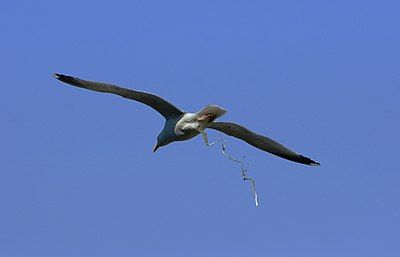Wikipedia:Main Page history/2022 June 15
From today's featured article
The pronunciation of GIF has been disputed since the 1990s. GIF, an acronym for the Graphics Interchange Format, is popularly pronounced in English as a one-syllable word. The most common pronunciations in English are /dʒɪf/ (![]() listen) (with a soft g as in gin) and /ɡɪf/ (
listen) (with a soft g as in gin) and /ɡɪf/ (![]() listen) (with a hard g as in gift), differing in the phoneme represented by the letter G. Many public figures and institutions have taken sides in the debate; Steve Wilhite, the file format's creator, gave a speech at the 2013 Webby Awards (slide pictured) arguing that only the soft g pronunciation is correct. Polls show that the hard g pronunciation is more common, although the frequency of each pronunciation varies by region; in addition, some speakers enunciate each letter in GIF, making it /dʒiː aɪ ɛf/ (
listen) (with a hard g as in gift), differing in the phoneme represented by the letter G. Many public figures and institutions have taken sides in the debate; Steve Wilhite, the file format's creator, gave a speech at the 2013 Webby Awards (slide pictured) arguing that only the soft g pronunciation is correct. Polls show that the hard g pronunciation is more common, although the frequency of each pronunciation varies by region; in addition, some speakers enunciate each letter in GIF, making it /dʒiː aɪ ɛf/ (![]() listen). English dictionaries generally accept both main alternatives as valid, and linguistic analyses show no clear advantage for either main pronunciation based on the pronunciation frequencies of similar English words. (Full article...)
listen). English dictionaries generally accept both main alternatives as valid, and linguistic analyses show no clear advantage for either main pronunciation based on the pronunciation frequencies of similar English words. (Full article...)
Did you know ...
- ... that Paul Arzens created the electric egg (pictured) in 1942, during the war in occupied Paris?
- ... that two-time Emmy winner George Yanok was the final road manager of the Kingston Trio and editor of their last album?
- ... that the 47 in the marijuana strain AK-47 may refer to the number of days between its planting and harvest?
- ... that Royal Ballet dancer Reece Clarke once filled in for a lead role mid-show, opposite a ballerina he had never danced with, after having ten minutes to prepare?
- ... that episodes of the TV Tokyo late-night show Nogizaka Under Construction are uploaded to YouTube shortly after broadcast, which is considered unusual in Japanese media?
- ... that Edward Severin Clark was bequeathed the Dakota in New York City when he was 12 years old?
- ... that Maria Olsvik was called up to the Norway national football team for the first time one year after giving birth?
- ... that the Key Underwood Coon Dog Memorial Graveyard is the only U.S. cemetery reserved exclusively for coon dog burials?
In the news
- Former Bolivian president Jeanine Áñez (pictured) is sentenced to ten years in prison on charges related to her succession to office during the 2019 political crisis.
- Voters in Kazakhstan pass 56 constitutional amendments in a referendum, following the January 2022 unrest.
- In Nigeria, at least 40 people are killed in an attack at a Catholic church in Owo, Ondo State.
- A fire and explosions at a storage depot in Sitakunda, Bangladesh, kill at least 47 people and injure around 450 others.
On this day
- 763 BC – The Bur-Sagale eclipse was observed in Assyria, the earliest solar eclipse mentioned in historical sources that has been successfully identified.
- 1815 – The Duchess of Richmond held a ball in Brussels, Belgium, that was described as "the most famous ball in history".
- 1919 – After nearly 16 hours in the air, the Vickers Vimy flown by John Alcock and Arthur Whitten Brown crash-landed in County Galway, Ireland, completing the first non-stop transatlantic flight.
- 1978 – King Hussein of Jordan married American Lisa Halaby, who became known as Queen Noor of Jordan (pictured).
- 2012 – American acrobat Nik Wallenda became the first person to walk a tightrope stretched directly over Niagara Falls.
- Eadburh of Winchester (d. 960)
- Antoine-François de Fourcroy (b. 1755)
- Choi Hong Hi (d. 2002)
Today's featured picture

|
Guano is the accumulated excrement of seabirds and bats. As a manure, guano is a highly effective fertilizer due to its exceptionally high content of nitrogen, phosphate, and potassium: key nutrients essential for plant growth. Guano was also, to a lesser extent, sought for the production of gunpowder and other explosive materials. The demand for guano in the 19th century spurred the human colonization of remote bird islands in many parts of the world, resulting in some of the first examples of United States colonialism and the expansion of the British Empire. However, the guano-mining process resulted in ecological degradation through the loss of millions of seabirds. This photograph, taken near Île-de-Bréhat in northwestern France, depicts a herring gull (Larus argentatus) excreting waste, which accumulates to form guano. Photograph credit: Nicolas Sanchez
Recently featured:
|
Other areas of Wikipedia
- Community portal – The central hub for editors, with resources, links, tasks, and announcements.
- Village pump – Forum for discussions about Wikipedia itself, including policies and technical issues.
- Site news – Sources of news about Wikipedia and the broader Wikimedia movement.
- Teahouse – Ask basic questions about using or editing Wikipedia.
- Help desk – Ask questions about using or editing Wikipedia.
- Reference desk – Ask research questions about encyclopedic topics.
- Content portals – A unique way to navigate the encyclopedia.
Wikipedia's sister projects
Wikipedia is written by volunteer editors and hosted by the Wikimedia Foundation, a non-profit organization that also hosts a range of other volunteer projects:
-
Commons
Free media repository -
MediaWiki
Wiki software development -
Meta-Wiki
Wikimedia project coordination -
Wikibooks
Free textbooks and manuals -
Wikidata
Free knowledge base -
Wikinews
Free-content news -
Wikiquote
Collection of quotations -
Wikisource
Free-content library -
Wikispecies
Directory of species -
Wikiversity
Free learning tools -
Wikivoyage
Free travel guide -
Wiktionary
Dictionary and thesaurus
Wikipedia languages
This Wikipedia is written in English. Many other Wikipedias are available; some of the largest are listed below.
-
1,000,000+ articles
-
250,000+ articles
-
50,000+ articles




